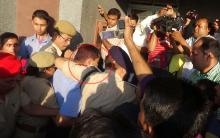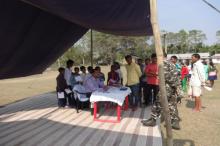Rice is the staple food for majority of the population in India. It contributes 65% of the total food grain production of the country.
With the food crisis and inflation wreaking havoc to the most under-served communities in India, researchers are looking for methods of increasing the rice production. Also the growing population and changing food habits are further making it critical to up the rice yield.
System of rice intensification (SRI) technology has immense potential of increasing the rice yield. This method of rice cultivation has become popular in many Indian states. However, still there are several states lacking with even the basic awareness of SRI technique. Needless to say there is a long way to go still to aware and effectively engage farmers in upping the rice cultivation using the SRI technique. The SRI is a new and evolving alternative to conventional methods of rice cultivation; originated in Madagascar.
There is a notion that higher yields in rice come with high investments on seed, irrigation, high doses of fertilizers and pesticides. Contrary to this popular view, SRI method of cultivation produces higher yields with less seed and less water. SRI emphasizes on the need to shift from chemical fertilizers to organic manures.
"Formal experimentation on SRI in India started in 2002-03. So far the method has been adapted and is being scaled up rapidly in Tamil Nadu, Andhra Pradesh, West Bengal, Jharkhand, Chhattisgarh and Gujarat. This method of cultivation of rice has already helped millions of farmers to at least double their yields", Said Banku Bihari Sarkar, Programme Coordinator, Grameen Development Services (GDS). GDS is also making special tools to be used in farming with SRI technique.
SRI is not a new variety or a hybrid. It is only a new method of cultivation. SRI is showing promising results in all rice varieties - local or improved. SRI method is emerging as a potential alternative to traditional way of flooded rice cultivation and is showing great promise to address the problems of water scarcity.
In the state of Uttar Pradesh, the Kharif crop is cultivated in 90 lakh hectares of land of which 59 lakh hectares is under paddy cultivation. Hence rice is a major crop here. If the SRI method is adapted by farmers for paddy cultivation in UP, not only this will potentially cut water requirement for paddy cultivation by 50% but also boost the rice production by 50%.
"With such far-reaching benefits of SRI, why are we not actively pushing SRI in UP" questioned Mr JL Dwivedi, a senior agriculture scientist of Narendra Dev Agriculture University.
SRI had earlier emerged as a set of six practices:
1) Transplanting young seedlings: Transplanting of very young seedlings between 8 to 12 days old to preserve potential for tailoring and rooting.
2) Planting single seedling: Planting seedlings singly very carefully and gently rather than in clumps of many seedlings.
3) Transplanting at wider spacing: Spacing them widely, at least 25 x 25 cm between plant to plant and as well as row to row; resulting in the spread of roots and acquiring more nutrients from the soil. This enables them to produce more tillers and more grains.
4) Using hand weeder to aerate the soil: Using a simple mechanical hand weeder (Cono weeder) to aerate the soil as well as to control weeds; this helps in vigorous root growth.
5) Keeping soil moist: Keeping the soil moist but not continuously flooded, drain out the surplus water; there is no need to maintain standing water.
6) Use organic manures: Use organic manure or compost to improve soil quality and fertility Organic manures improve soil aeration and also microbial activity.
Particularly in these times of rising food crisis, inflation and water scarcity, it is of utmost significance to use such eco-friendly and effective techniques like SRI to up the rice production. Let us hope the authorities are listening!
Amit Dwivedi
(The author is the Special Correspondent to Citizen News Service (CNS) and can be contacted at: amit@theindiancitizen.org)
With the food crisis and inflation wreaking havoc to the most under-served communities in India, researchers are looking for methods of increasing the rice production. Also the growing population and changing food habits are further making it critical to up the rice yield.
System of rice intensification (SRI) technology has immense potential of increasing the rice yield. This method of rice cultivation has become popular in many Indian states. However, still there are several states lacking with even the basic awareness of SRI technique. Needless to say there is a long way to go still to aware and effectively engage farmers in upping the rice cultivation using the SRI technique. The SRI is a new and evolving alternative to conventional methods of rice cultivation; originated in Madagascar.
There is a notion that higher yields in rice come with high investments on seed, irrigation, high doses of fertilizers and pesticides. Contrary to this popular view, SRI method of cultivation produces higher yields with less seed and less water. SRI emphasizes on the need to shift from chemical fertilizers to organic manures.
"Formal experimentation on SRI in India started in 2002-03. So far the method has been adapted and is being scaled up rapidly in Tamil Nadu, Andhra Pradesh, West Bengal, Jharkhand, Chhattisgarh and Gujarat. This method of cultivation of rice has already helped millions of farmers to at least double their yields", Said Banku Bihari Sarkar, Programme Coordinator, Grameen Development Services (GDS). GDS is also making special tools to be used in farming with SRI technique.
SRI is not a new variety or a hybrid. It is only a new method of cultivation. SRI is showing promising results in all rice varieties - local or improved. SRI method is emerging as a potential alternative to traditional way of flooded rice cultivation and is showing great promise to address the problems of water scarcity.
In the state of Uttar Pradesh, the Kharif crop is cultivated in 90 lakh hectares of land of which 59 lakh hectares is under paddy cultivation. Hence rice is a major crop here. If the SRI method is adapted by farmers for paddy cultivation in UP, not only this will potentially cut water requirement for paddy cultivation by 50% but also boost the rice production by 50%.
"With such far-reaching benefits of SRI, why are we not actively pushing SRI in UP" questioned Mr JL Dwivedi, a senior agriculture scientist of Narendra Dev Agriculture University.
SRI had earlier emerged as a set of six practices:
1) Transplanting young seedlings: Transplanting of very young seedlings between 8 to 12 days old to preserve potential for tailoring and rooting.
2) Planting single seedling: Planting seedlings singly very carefully and gently rather than in clumps of many seedlings.
3) Transplanting at wider spacing: Spacing them widely, at least 25 x 25 cm between plant to plant and as well as row to row; resulting in the spread of roots and acquiring more nutrients from the soil. This enables them to produce more tillers and more grains.
4) Using hand weeder to aerate the soil: Using a simple mechanical hand weeder (Cono weeder) to aerate the soil as well as to control weeds; this helps in vigorous root growth.
5) Keeping soil moist: Keeping the soil moist but not continuously flooded, drain out the surplus water; there is no need to maintain standing water.
6) Use organic manures: Use organic manure or compost to improve soil quality and fertility Organic manures improve soil aeration and also microbial activity.
Particularly in these times of rising food crisis, inflation and water scarcity, it is of utmost significance to use such eco-friendly and effective techniques like SRI to up the rice production. Let us hope the authorities are listening!
Amit Dwivedi
(The author is the Special Correspondent to Citizen News Service (CNS) and can be contacted at: amit@theindiancitizen.org)






Comments
Pages
Add new comment